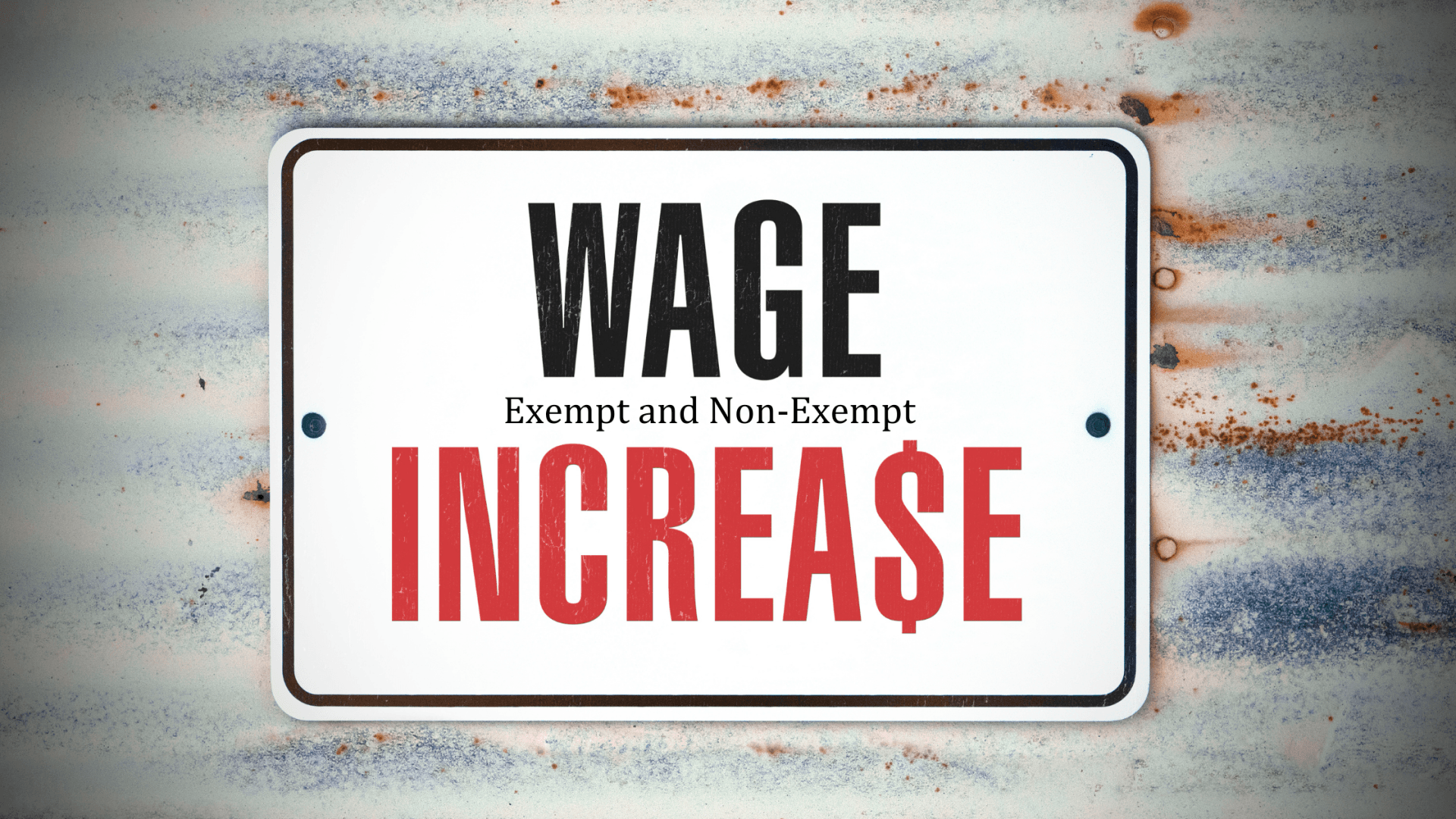
Updated 3/25/2022
This article explains how to pay employees, as well as the new minimum wage that went into effect back on 12/31/2021. Non-compliance with the information could lead to repercussions during a DOL audit.
The New York State Department of Labor late last year published final rule regarding the increased salary thresholds to be considered exempt from overtime as well as changes to the minimum wage schedule.
Under both federal and New York law, employers must pay non-exempt employees at least the minimum wage for each hour worked and 1.5 times their regular rate of pay whenever they work more than 40 hours in a workweek. While most employees must be classified as non-exempt, federal, and state law include exemptions from the minimum wage and overtime requirements for certain employees, including bona fide professional, administrative, and executive employees.
Remember, it is not enough to simply pay an employee what an “Exempt” employee is supposed to receive and expect that employee to be classified as EXEMPT. They have to meet the criteria:
• Must be paid equal to the requirements set forth for the Exempt Qualifications (i.e. Administrative, Professional, Executive)
• Paid on a Salary Basis (Paid a Salary each pay period regardless of the hours they work. * with limited exceptions)
• Must meet the Job Duties Test for their position
If they do not meet ALL THREE of these criteria, then they can not be classified as exempt, and if an employer chooses to do so, an employer’s level of exposure to a Department of Labor Audit is greatly increased. The duties tests are further explained below.
Employees who meet the duties test under the Fair Labor Standards Act (FLSA) for executive and administrative exemptions must also meet the salary level requirements in New York in order to be exempt. New York’s exempt employee salary threshold will adjust annually in proportion to increases in the minimum wage. All rate changes will take effect on December 31st of each year.
Below is an overview of exemption tests under New York law.
Salary-Level Test (New York):
Administrative and Executive Exemptions:
For the administrative and executive exemptions, the minimum salary is 75 times the state minimum wage. The minimum salary differs based on where in the state the employee works.
Here are the minimum salary requirements currently in effect in New York:
NYC $1125.00
Other NY counties (Outside of NYC) $990.00
Remainder of Downstate (Nassau, Suffolk & Westchester counties) $1125.00
As of 12/31/2021 – Other NY counties (Outside of NYC) $990.00
As of 12/31/2021 – Remainder of Downstate (Nassau, Suffolk & Westchester counties) $1,125.00
Professional Exemption:
For the professional exemption, there is no minimum salary requirement under NY State law, but the federal Fair Labor Standards Act (FLSA) has a minimum. In this case, most New York employers would be required to meet the FLSA's minimum salary requirement for the professional exemption (in addition to meeting the federal and state duties tests).
Currently, to qualify for the professional exemption under the FLSA, an employee must be paid a salary of at least $684.00 per week ($35,568 annually).
Salary-Basis Test:
New York generally follows federal rules for the salary-basis test. To qualify for the state and federal exemption, an employee must receive their full salary for any week in which they perform any work. Salary reductions are not permitted due to variations in the quality or quantity of the employee's work.
For exempt employees, salary deductions are limited to the following circumstances:
• One or more full day absences for personal reasons other than sickness or disability.
• Absences of one or more full days due to sickness or disability if the deduction is made in accordance with a bona fide plan, policy, or practice of providing compensation for salary lost due to illness.
• To offset jury or witness fees, or for military pay.
• For penalties imposed in good faith for infractions of safety rules of major significance.
• For unpaid disciplinary suspensions of one or more full days imposed in good faith for serious misconduct, such as sexual harassment, workplace violence, drug, or alcohol use, or for violations of state or federal laws. The suspension must be imposed pursuant to a written policy applicable to all employees.
• In the employee's first or last week of employment if the employee does not work the full week; or
• For unpaid leave taken by the employee under the Family and Medical Leave Act.
Under federal and state rules, deductions from exempt employees' salaries for any other reason are prohibited.
Duties Test (New York):
New York's duties tests vary for each exemption and are slightly different than the federal duties tests.
Administrative Exemption:
To qualify for the administrative exemption under New York law:
• The employee's primary duty must involve performing office or non-manual work directly related to management policies or the employer's general operations.
• The employee must regularly exercise discretion and independent judgment; and
• The employee must:
o Regularly and directly assist the employer or an employee employed in a bona fide executive or administrative capacity; or
o Perform, under only general supervision, specialized or technical work requiring special training, experience, or knowledge.
NOTE: To see who typically falls under the Administrative Exemption, see the attached Administrative Exemption PDF
Professional Exemption:
To qualify for the professional exemption under New York law, the employee's primary duty must consist of performing work that requires advanced knowledge in a field of science or learning customarily acquired by a prolonged course of specialized intellectual instruction and study.
The employee's work must:
• Require the consistent exercise of discretion and judgment.
• Be predominantly intellectual and varied in character (as opposed to routine mental, manual, mechanical, or physical work); and
• Be of such a character that the output produced cannot be standardized in relation to a given period.
• NOTE: To see who typically falls under the Professional Exemption, see the attached Professional Exemption PDF
Executive Exemption:
To qualify for the executive exemption under New York law the:
• Employee's primary duty must consist of the managing a customarily recognized department or subdivision of the enterprise.
• Employee must customarily and regularly direct the work of two or more other employees.
• Employee must have the authority to hire or fire other employees, or their suggestions and recommendations will be given weight; and
• Employee must customarily and regularly exercise discretionary powers.
• NOTE: To see who typically falls under the Executive Exemption, see the attached Executive Exemption PDF
An employee's "primary duty" is generally defined as the principal, main, major, or most important duty that the employee performs. The determination of an employee's primary duty must be based on all the facts in a case, with the major emphasis on the character of the employee's job.
Conclusion:
Before classifying employees as exempt from overtime, make sure that the employee satisfies the salary-level, salary-basis, and duties tests under both federal and state law. If an employee is covered by both the federal and state law but does not meet both sets of tests, consult with counsel and/or a CPA to determine how you should classify the employee in that situation.
Also note as of 12/31/2021:
The NY State minimum wage for Long Island and Westchester counties will increase from $14.00 per hour to $15.00 per hour
*Annual increases for the rest of the state will continue until the rate reaches $15 minimum wage (and $10 tipped wage). Starting 2022, the annual increases will be published by the Commissioner of Labor on or before October 1. They will be based on percentage increases determined by the Director of the Division of Budget, based on economic indices, including the Consumer Price Index.
The NY State minimum wage for counties outside of NYC will increase from $12.50 per hour to $13.20 per hour.
Sign up for our newsletter.




